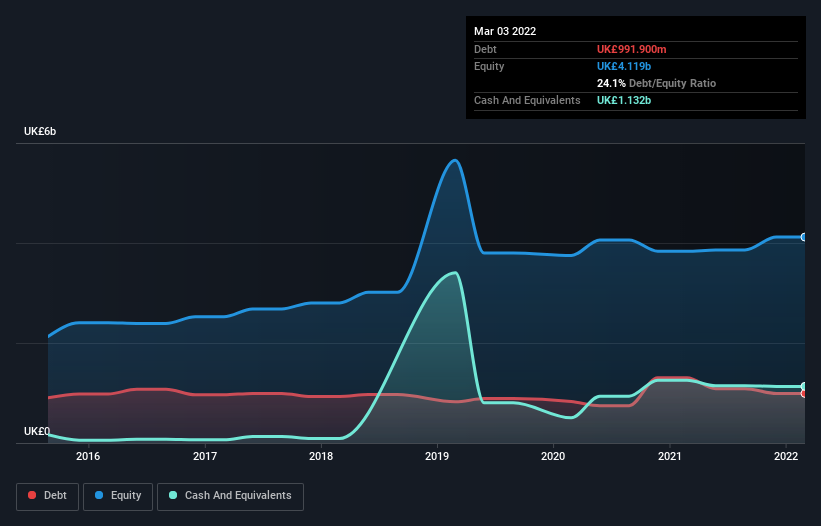
Legendary fund manager Li Lu (who Charlie Munger backed) once said, 'The biggest investment risk is not the volatility of prices, but whether you will suffer a permanent loss of capital.' When we think about how risky a company is, we always like to look at its use of debt, since debt overload can lead to ruin. We can see that Whitbread plc (LON:WTB) does use debt in its business. But the more important question is: how much risk is that debt creating?
When Is Debt A Problem?
Debt is a tool to help businesses grow, but if a business is incapable of paying off its lenders, then it exists at their mercy. Part and parcel of capitalism is the process of 'creative destruction' where failed businesses are mercilessly liquidated by their bankers. However, a more usual (but still expensive) situation is where a company must dilute shareholders at a cheap share price simply to get debt under control. Of course, plenty of companies use debt to fund growth, without any negative consequences. The first step when considering a company's debt levels is to consider its cash and debt together.
View our latest analysis for Whitbread
What Is Whitbread's Debt?
The image below, which you can click on for greater detail, shows that Whitbread had debt of UK£991.9m at the end of March 2022, a reduction from UK£1.30b over a year. But on the other hand it also has UK£1.13b in cash, leading to a UK£140.5m net cash position.

How Healthy Is Whitbread's Balance Sheet?
We can see from the most recent balance sheet that Whitbread had liabilities of UK£719.6m falling due within a year, and liabilities of UK£4.73b due beyond that. Offsetting these obligations, it had cash of UK£1.13b as well as receivables valued at UK£92.2m due within 12 months. So it has liabilities totalling UK£4.22b more than its cash and near-term receivables, combined.
This deficit is considerable relative to its market capitalization of UK£5.17b, so it does suggest shareholders should keep an eye on Whitbread's use of debt. Should its lenders demand that it shore up the balance sheet, shareholders would likely face severe dilution. Despite its noteworthy liabilities, Whitbread boasts net cash, so it's fair to say it does not have a heavy debt load!
We also note that Whitbread improved its EBIT from a last year's loss to a positive UK£83m. There's no doubt that we learn most about debt from the balance sheet. But it is future earnings, more than anything, that will determine Whitbread's ability to maintain a healthy balance sheet going forward. So if you're focused on the future you can check out this free report showing analyst profit forecasts.
Finally, a business needs free cash flow to pay off debt; accounting profits just don't cut it. While Whitbread has net cash on its balance sheet, it's still worth taking a look at its ability to convert earnings before interest and tax (EBIT) to free cash flow, to help us understand how quickly it is building (or eroding) that cash balance. Over the last year, Whitbread actually produced more free cash flow than EBIT. That sort of strong cash generation warms our hearts like a puppy in a bumblebee suit.
Summing up
Although Whitbread's balance sheet isn't particularly strong, due to the total liabilities, it is clearly positive to see that it has net cash of UK£140.5m. The cherry on top was that in converted 344% of that EBIT to free cash flow, bringing in UK£287m. So we don't have any problem with Whitbread's use of debt. There's no doubt that we learn most about debt from the balance sheet. But ultimately, every company can contain risks that exist outside of the balance sheet. For instance, we've identified 1 warning sign for Whitbread that you should be aware of.
If you're interested in investing in businesses that can grow profits without the burden of debt, then check out this free list of growing businesses that have net cash on the balance sheet.
Valuation is complex, but we're here to simplify it.
Discover if Whitbread might be undervalued or overvalued with our detailed analysis, featuring fair value estimates, potential risks, dividends, insider trades, and its financial condition.
Access Free AnalysisHave feedback on this article? Concerned about the content? Get in touch with us directly. Alternatively, email editorial-team (at) simplywallst.com.
This article by Simply Wall St is general in nature. We provide commentary based on historical data and analyst forecasts only using an unbiased methodology and our articles are not intended to be financial advice. It does not constitute a recommendation to buy or sell any stock, and does not take account of your objectives, or your financial situation. We aim to bring you long-term focused analysis driven by fundamental data. Note that our analysis may not factor in the latest price-sensitive company announcements or qualitative material. Simply Wall St has no position in any stocks mentioned.
About LSE:WTB
Whitbread
Operates hotels and restaurants in the United Kingdom, Germany, and internationally.
Good value with adequate balance sheet and pays a dividend.


